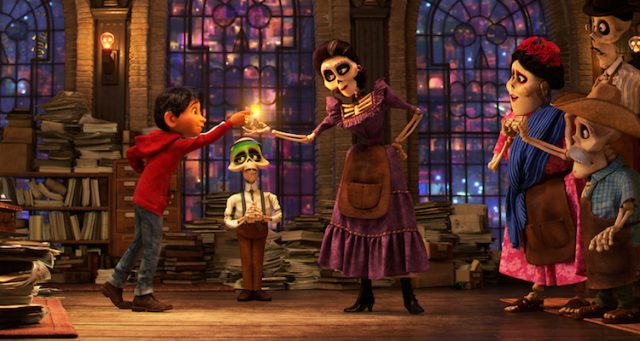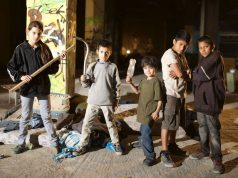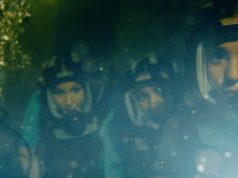
There are plenty of cartoons about holidays like Christmas and Halloween, but the genius-nerds at Pixar saw an unfilled need and came up with “Coco,” the first major animated film about Día de Muertos, or Day of the Dead, observed in Mexico and by Mexicans everywhere. Making a film to appeal to an untapped market is good business sense, but “Coco” also has that trademark Pixar sincerity, the sense that the storytellers really wanted to do justice to the subject and not just pander to an audience.
What they came up with is an earnest values-based story about honoring and remembering every branch of the family tree. Aside from being a lively adventure comedy, “Coco” is also an introduction to — and assiduously earnest portrayal of — some cultural traditions that many viewers haven’t seen before. It is a noble thing to expand an audience’s worldview, and director Lee Unkrich (“Toy Story 3”), who conceived the story with screenwriters Matthew Aldrich and Adrian Molina (who also co-directs), does it without sacrificing entertainment value.
Our junior Mexican hero is 12-year-old Miguel Rivera (voice of Anthony Gonzalez), a would-be musician whose dreams of stardom are hindered by one thing: his family hates music. Seems his great-great-grandfather was an ambitious troubadour who walked out on his wife and young daughter to pursue a music career, and the Riveras have been staunchly anti-music ever since. Miguel has to hide his guitar and practice in secret lest he offend his elders, the eldest of which is his great-grandmother Coco (Ana Ofelia Murguia), the little girl whose father left. Coco must be 90 now, near death, her memory fading. She still occasionally mentions “Papá,” whom the family has never forgiven. She’s the connection between the living and the dead, and it’s fitting that the movie is named after her.
While preparing photos of departed loved ones for Día de Muertos, Miguel finds evidence that his infamous great-great-grandfather was none other than his idol, Ernesto de la Cruz (Benjamin Bratt), a legendary musician who died many years ago and is still beloved throughout Mexico. In his eagerness, Miguel does something that offends the spirits and puts him, a living boy, in the land of the dead, a sort of parallel dimension that overlaps with ours.
His dead ancestors are surprised to see him, and surprised that HE can see THEM. He can cross back to the realm of the living with the blessing of a relative — but his great-great-grandmother, Mamá Imelda (Alanna Ubach), will only grant it on the condition that he not pursue a career in music. Instead of taking the blessing and going back to the living world, Miguel sets out to find Ernesto de la Cruz here in the land of the dead. (What would a Pixar movie be without a journey and a quest?)
Miguel is soon joined by Hector (Gael Garcia Bernal), a rascal and a scammer who’s been forgotten by almost everyone in the living world. He wants to send a photo of himself back with Miguel to put on an ofrenda, which will allow Hector to visit the living on Día de Muertos. (That’s the deal, you see. The dead can come visit once a year, but only if someone puts their photo on a makeshift altar.)
The film has lots of fun with the dead, portrayed as skeletons (with eyeballs and clothing) whose component parts can disassemble at will, especially if it produces a funny sight gag (like when a surprise causes a man’s jaw to drop right off his skull). Having created a vivid world full of Día de Muertos details, Unkrich and his team run around in it like kids exploring, enjoying the scenery while they tell their story.
It’s a twisting, surprising story, too, with unexpected complexity. We think we’re in for a “follow your dreams” message, maybe some “power of music to transform the soul” ideas, but those themes, while present, are less vital than the old-fashioned reminder at the heart of the movie: “There’s nothing more important than family.” As usual, you get the feeling the storytellers truly believe it, and they infuse it with beautiful imagery and an appreciation for Mexican culture. Bien hecho, Pixar.
B+ (1 hr., 49 min.; )





